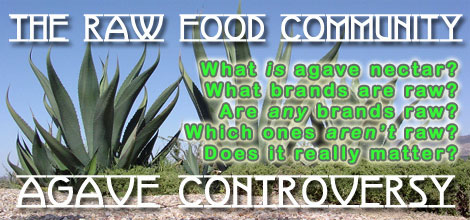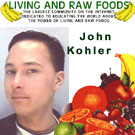
Within the raw food community, a controversy seems to have been brewing for the better part of a year! The topic: Agave nectar (also called agave syrup). Surely by now most people know what agave nectar is. For anyone who doesn't, it's a thick liquid sweetener made from, you guessed it, the agave plant.
In general, the production of tasty agave nectar involves heating the plant to a certain temperature (which varies widely according to which manufacturer is making it and which species of agave is used). The extent of this heating constitutes a significant part of the controversy (as most raw foodists believe that heating any food over a certain temperature, usually somewhere between 105 and 118 degrees fahrenheit, renders it "dead").
Almost nine months ago, the popular natural health web site Natural News ran an article titled "Agave Nectar, the High Fructose Health Food Fraud" (available here) by citizen journalist Rami Nagel. This piece largely set off a controversy that continues to this day (although, in fairness, it's true that the general merits of agave nectar -- e.g., whether it is, in fact, a suitable low-glycemic sugar substitute, as it's surely often advertised -- have been publicly debated from time to time before the appearance of that article).
A few weeks after the publication of that article, Craig Gerbore, president of the Madhava brand agave nectar producer, published a thorough rebuttal to Nagel's piece (available here, also on Natural News). Among other important points, Gerbore outlined reasons why Madhava's brand of agave nectar can reasonably be deemed raw (although, in our reading of his rebuttal, he cites "low temperatures" used in a vacuum-evaporation process; what the exact temperature is, he didn't say).
So, that's essentially the back-story on the controversy. We thought we'd share some opinions of a few others we respect, and then share our own take on the matter as well:

|
The Gianni's: Kevin's been on this issue for quite some time over at the Renegade Health show!
Kevin's opinion is anti-agave. |

|
John Kohler from Living-foods.com (one of Wendi's all-time favorite raw food forums) has an informative agave article here.
John's opinion is anti-agave. |

|
Here's Dr. Mercola's take on Agave (as referenced from We Like It Raw -- thanks!)
Dr. Mercola's opinion is anti-agave. |

|
Finally, here's a piece from Bueller's blog covering agave. She's a brilliant writer and researcher, always thoroughly looking into a subject before sharing her opinion!
Bueller's opinion is anti-agave. |
?? ??
So, What's Pure Jeevan's Take on the Matter?
First, we wanted to note that we feel it's optimal to eat as many whole fruits, vegetables, nuts, and seeds as possible. Clearly, those items, in their natural state, constitute the healthiest sources of nutrition for our bodies. But, we have historically used other lightly-processed (yet still raw) ingredients in our recipes over the course of our raw journey, and this would certainly include agave nectar.
Once we found out, during the initial raw agave controvery, that most agave nectars aren't truly raw, we began using only the Madhava brand. As Kevin points out in his most recent video covering the agave controversy, Madhava has discontinued their raw agave (there are other brands claiming to be raw, but you'll need to contact the manufacturer to check if the company truly produces a raw agave product). Since we feel strongly about consuming only raw foods, we've been using dates in place of agave for the past few months. We haven't been making many sweet desserts, so we're not sure how well some of our favorite raw recipes can be converted from agave to dates. (We'll be sure to update you on how to substitute dates for agave as we experiment more with this.)
Some raw foodists are using honey or maple syrup in place of agave. It's an individual choice what you choose to use. For us, we actively practice ahimsa and don't consume any honey because we don't believe in harming any living creature for our own pleasure. (No matter how nice bee keepers are, some bees are harmed in the harvesting of honey.) Additionally, there's an interesting chart in Dr.Gabriel Cousen's book Rainbow Green Live-Food Cuisine that indicates the number of pathogenic microorganisms in various foods (pathogens being, of course, agents of disease, such as fungi and bacteria). In an average vegan meal, there are just 500 such microorganisms.In one cup of honey, there are 5,000,000 such pathogenic microorganisms.
As for maple syrup, it's very far from being a raw sweetner. Rendering maple syrup requires high temperatures for an extremely long time. For us, we're trying to consume foods that aren't heated, since the heating process changes the natural structure of foods. There are quite a few raw foodists who consume maple syrup and seem to be in great health, so do what you feel is right for your body. (And, a quick note from our early, non-raw-yet-still-health-conscious years: Go for the healthier organic Grade B, not the Grade A.)
We all have to make individualized decisions based on our own beliefs, health, research, etc. What we've tried to do in this blog post is share with you some of what others have discussed about the agave controversy, so you can be more informed when making your own decision about what sweetner, if any, you'd like to use in your raw food diet.
As a side note, we'd like to point out that we both lost weight and increased our health while following a raw food diet that contained a lot of agave nectar. In the beginning, the desserts containing the agave nectar were delicious and easy to consume and enjoy. We're not so sure the raw path would have been so easy to follow without the use of agave.
We're not recommending that others consume agave; we're just sharing that it didn't seem to have a negative impact on our health during the first few years of the raw food lifestyle. Perhaps if we had liver problems it wouldn't have been a good idea to consume agave. It's probably not a good idea for anyone to consume large quantities of it long-term, either. But, based on our own experiences we don't think using agave for the first few years of a raw diet is such a bad idea. It might not be the best idea, either, though!
If you are eating a clean diet and you include some processed food like agave, we feel you are still doing great compared to the vast majority of people on this planet.
Original Comments
Below, we have included the original comments from this blog post. Additional comments may be made via Facebook, below.
On August 20, 2009, wrote:
Excellent post my friends...and my approach is this: Common sense dictates that agave is ok because the plant it comes from grows and prospers in daily heat well over 118 degrees (in so far as I know). I don't use very much of it, none some days, other days, 2 T (that is 1 T in my breakfast smoothie and 1 T in my raw cacao and coconut oil dessert in the evening). I've been consistently losing weight, detoxifying, and experiencing improved health in all respects. I so agree with you that without agave, I would have had a much more difficult transition from a mostly healthy diet to raw. I've used a sum total of only a couple of tablespoons honey or maple syrup in the last six months or so - and that was only until I found agave. So for me, I'm pro-agave. I use the blue agave if that matters.
On August 20, 2009, wrote:
I agree that if one uses Agave occasionally and is eating a predominantly raw diet than we are doing WAY better than 99% of the rest of the population. However I do not feel that sweeteners need to be a daily or frequent part of a healthy raw diet. I realize that some need it for the transition process and that is fine ( I was lucky to have been off processed sugar for years prior to switching to raw so fruit was my joy :-) but raw desserts for example, while far better than SAD diet desserts, are not something we should be having very often anyways. They pack a powerful punch of fructose/sugars (and often fats too from the nuts) into our body. Raw or not that is not something we should subject our body to very often. I do feel that when whole food sweeteners can be used instead of Agave or honey ( which has no fibre to slow the release of the sugars) that they should be the first choice. For example I now substitute a whole Medjool date into the "Milkshake" recipe that Wendi sent out a couple of weeks ago. ( I do the non nut version). I found that the dates actually taste better in the shake, to me anyways, than the Agave. I would not hesitate to use Agave in a very occasional raw dessert recipe tho. For me honey packs a noticeable wallop that leaves me feeling sugar buzzed and off balance. Agave does not.
On August 20, 2009, wrote:
i'm all for "raw" agave nectar as a transition food for new raw foodists. even though many raw foodists are calling it unhealthy now and not true raw, i still feel it's a good in small amounts.
in smoothies, i now only use 1 tsp of agave nectar. the bananas, blueberries, raisins, etc provide the rest of the sweetening.
life is all about transitioning toward a more enlightened state of well-being. and each person is at varying states of transition. each individual's path is his/her own, as long as s/he is moving in the right direction.
btw. dr. mercola might be criticizing the health benefits of agave nectar, but i'm wonder about his promoting raw eggs and raw milk. hmm... what do you think about that?
On August 21, 2009, wrote:
I still don't get it! Why are they saying Agave isn't raw? Our Agave - Wholesome Sweeteners' Organic Raw Blue Agave - claims to be processed at temps less than 118 degrees F, which (unless they're lying) qualifies as raw, right? Also, since fructose, the component of Agave that supposedly makes it unhealthy, is fruit sugar and is the predominate sugar in most fruits, how come so many fruititarians are so healthy and are not reporting any ill effects of an obviously heavy load of fructose consumed in a mainly fruit diet? There are tons of theories and hypothesis flying around the raw food community (many conflicting), but a definite shortage of clinical trials or "absolutes" regarding what's good for us - or not ... guess there just hasn't been enough true research being done yet.
On August 21, 2009, wrote:
I think that's a great, relevant point, Sheila -- about the natural environment of the agave plant. I'm sure the plant experiences 120+ degree heat regularly. Heck, it grows in deserts! So, what does that mean ?? It's clearly alive, yet beyond the accepted range of live foods (topping out at 118). I think the jury's still out on agave. But personally... (I'll continue this below, responding to Joanne)...
On August 21, 2009, wrote:
... as I was saying above... personally, I agree that dates taste better. I know that's subjective, though. I think Wendi originally preferred the agave (but now also uses dates). I've always made that milkshake with a couple of Medjool dates tossed in. Sometimes, at Doug Graham's suggestion, I've even purposely not blended it all the way, which leaves larger chunks of date in the smoothie -- which seem like candy bits or something. LOL, I'm such a kid sometimes... so easily pleased. :-)
On August 21, 2009, wrote:
"life is all about transitioning toward a more enlightened state of well-being. and each person is at varying states of transition. each individual's path is his/her own, as long as s/he is moving in the right direction."
Well said, Carlos!! :-)
I didn't watch the Dr. M. thing enough to see him promote raw dairy. We're vegans, here, of course. So, we don't consume it at all. I always used to think that, if you were going to consume it, it would be healthier raw. But, along with the pathogenic microorganism stats I cited in the above blog post (about honey) from Gabriel Cousens' book, there were similar numbers related to dairy -- and those numbers were off the charts (meaning indicative of *extremely high* pathogen counts, way higher than honey).
On August 22, 2009, wrote:
I don't get it, why are they saying Agave isn't raw? Our Agave - Wholesome Sweeteners' Organic Raw Blue Agave - claims to be processed at temps less than 118 degrees F, which (unless they're lying) qualifies as raw, right? Also, since fructose, the component of Agave that supposedly makes it unhealthy, is fruit sugar and is the predominate sugar in most fruits, how come so many fruititarians are so healthy and are not reporting any ill effects of an obviously heavy load of fructose consumed in a mainly fruit diet? There are a lot of theories and hypothesis flying around the raw food community (many conflicting), but a definite shortage of clinical trials or "absolutes" regarding what's good for us - or not ... guess there just hasn't been enough true research done yet.
On August 26, 2009, wrote:
Hi!
You recommended: (And, a quick note from our early, non-raw-yet-still-health-conscious years: Go for the healthier organic Grade B, not the Grade A.)
I live in Vermont on a mountain just covered with sugar maple trees, and my husband and I make maple syrup. I just wanted you to know that the grade of maple syrup has nothing whatsoever to do with its nutritional value. The lighter colored syrup (Grades A light, A medium, and A dark) are from the earlier-in-the-season sap. They are lighter in color and lighter in flavor. The Grade B is from the end of the season when the trees are getting ready to bud. The color is darker and the flavor is much stronger. But all grades are made the exact same way - boiled down from 40 gallons of sap to make one gallon of syrup.
Still - nothing is added, and the only processing to make it is boiling it. And ALL of it is organic, whether it is marked "organic" or not. It is taken from trees in the wild (in the woods) - no one sprays pesticides in the woods!
Just thought you should know.
On September 8, 2009, wrote:
I am a homoeopath. We have a medicine prepared from Agave. It also have medicinal power. So useful plant.
On September 28, 2009, wrote:
Hi Patty & Denny-
For some very strange reason, your comment too one month to come through our system! (We're not sure why!) But, I think we may have, in fact, exchanged some emails about this. However, I did want to reply here, too. You know, I was just reading some Gabriel Cousens stuff lately where he talks about ayurvedic principles that come into play even in raw diets. One's dosha, for example, would play a role in whether you're predetermined to have sugar issues or not. So, from a scientific standpoint, it could very well be that some people can be fruitarians and other cannot. (I think I could! And, I think I'd like that!!) ...but of course we run into trouble when we attempt to generalize a "rule." I think the state of the art, as it were, is pretty much exactly as you've described -- looking into some of these remaining mysteries. (And,of course, there will always be remaining mysteries.) I do know that, if I lived in the desert and saw some agave, I'd be happy to try to harvest some agave nectar. Until that day happens, I won't have much more of an informed perspective than anyone else who doesn't currently live in a desert. I do recall that it's not always the temperature with which critics sometimes have a problem. Sometimes it's other aspects of the manufacturing or harvesting process -- things like nondisclosed chemical additives or exposure. I can't speak to the Wholesome Sweeteners brand, but I have heard these criticisms in general.
-Jim
On September 28, 2009, wrote:
Okay, now we're getting your comments TWICE! LOL... that's okay. I'd rather have them twice than not at all! -JD
On September 28, 2009, wrote:
Hi Robin- Hmmm, I seem to have missed your comment as well here! I think we had a small glitch with this post or something. Anyway, I have a few points from a non-pro...
1. You stated that "the grade of maple syrup has nothing whatsoever to do with its nutritional value." However, I would submit that, since the grade relates to the final color of the syrup produced, the nutritional value of the syrup is probably affected. I believe our own enlightenment on the matter came during Wendi's "Master Cleanse" days, when that grade (B) was specified for nutritional reasons. (It also specified "organic," which I'll address in a moment.) From there, we adopted a preference for B (based on taste as well as nutrition). In any case, whether it's more or less filled with nutrients, it stands to reason that, if it DOES in fact have a different taste and appearance, then it DOES differ nutritionally somehow (even if it's only sugar content or a few minerals). I always assumed that the later-in-the-season stuff reflected a greater accumulation of various nutrients or minerals. But, I have admittedly never studied the matter very closely. Back then, I was simply a "let's make pancakes!" kind of guy.
2. As I mentioned regarding Agave, above, it's not always pesticides use that determines whether something is considered "organic." In the case of Maple Syrup, it could also lie in the processing. For example, this site -- http://www.gradebmaplesyrup.org/whygradebmaple.... -- writes: "Paraformaldehyde pellets may be inserted into the tap holes to prevent sap from clotting and clogging holes. Some residue of this poison may therefore be present in non-organic maple syrup, and this procedure may also shorten the overall lifespan of the trees. Another concern is the potential danger of lead being present in the maple syrup. Some maple sap collectors use pans and buckets which have seams and patches that are soldered with lead. The maple syrup can also pick up lead from seams and containers used for packing and storage."
So, like "raw," the "organic" designation also relates to the *processing* (at least in spirit, I suppose). Now, do the organic certifiers look to those two specific things in the maple syrup world? I couldn't honestly say. It does seem implied by that web site, though. And, I personally hope that those two things are part of the process. I wouldn't want to accidentally eat formaldehyde residue, and I'm sure the tree would be enormously happier without having that unnecessary chemical introduced into its system.
I wonder what they did prior to the mid- to late-1800s when formaldehyde production took off? Surely they made maple syrup back then... I suppose there is likely a nontoxic "old-school" method of addressing those tap holes. Please share any thoughts or history on that!! :-)
Thanks,
-Jim
